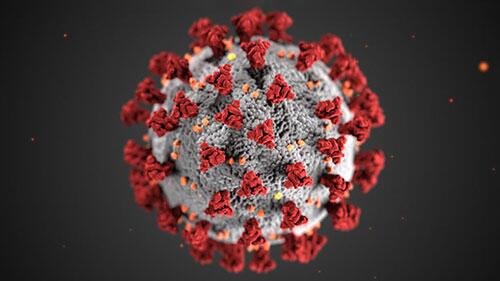The New Reality of COVID-19

The COVID-19 virus. Image via dhs.gov.
On March 12, 2020, the World Health Organization declared the COVID-19 outbreak a pandemic. Since then, the virus and efforts to slow its spread have not only changed our lives on DSU’s campus, but also lives around the world.
Scientists are still working on a vaccine for this virus which the media has compared to the flu or pneumonia. While some of COVID-19’s symptoms are similar to the flu, it has a much much higher death rate and is much more serious than the flu.
This novel coronavirus originated in Wuhan, China and has infected every country in the world. The survival rate is at 80%, according to CDC.gov. However, the death rate may be higher for the elderly or people with pre-existing conditions such as asthma or immuno-deficiencies.
COVID-19 in the U.S.
The virus has caused a widespread panic throughout the United States. Many people are overbuying or hoarding supplies like hand sanitizer and toilet paper.
States including California, New York, Illinois, and Virginia have gone on lockdown to try to slow the spread of COVID-19 and ease the stress being put on medical facilities. Many state governments have put non-essential jobs on hold for the time.
COVID-19 in Mississippi
Across Mississippi, districts have closed public schools until mid- April, and colleges have converted face-to-face classes to online only.
Delta State has limited the traffic on campus by cutting the amount of employees working onsite. Nonessential employees who cannot work from home will still receive a paycheck each month, however.
Delta State has also recommended that students leave the dorms unless they have nowhere safe to go or can’t access the internet from home.
Prevention and Future Projections
President Trump has recommended to actively use social distancing. He suggests limiting social gatherings to ten people or fewer. Although the president had hoped to lift the restrictions by Easter, the U.S. government has decided that it will be necessary to continue social distancing at least until the end of April.
For the best odds of not contracting or spreading the virus, the CDC recommends that you actively use social distancing methods along with adequate hygiene. This consists of washing your hands, not touching your face and keeping a distance from large gatherings.
According to APnews.com, President Trump said the U.S may be dealing with this outbreak through July or August.

Anthony Brown is a 21-year-old from Greenville, Miss. who originally wanted to be a cartoonist and then a lawyer. After realizing he would more than likely...


